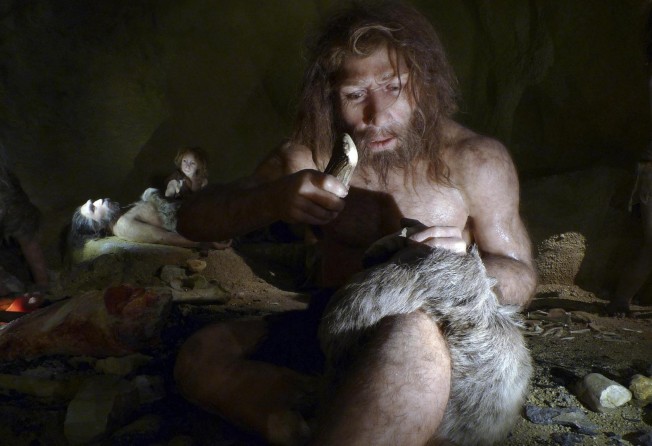Are devotees of the new Paleo diet right to think our prehistoric ancestors ate and lived better?
Paleo diet devotees think our prehistoric ancestors ate and lived better before the agricultural revolution

Modern food is bad for our health. The food industry is poisoning us. To save ourselves, we should eat like cavemen. That, at least, is according to gurus of the Paleo and gluten-free diets, the latest food fads from the West. Natural fruits, veggies, nuts and seeds are in. Some meat, poultry, fish and other seafood are OK, too. But processed food, sugar, salt, diary products and anything with gluten are bad.
This is based on the belief that our prehistoric ancestors - the hunters-gatherers - not only ate better, but lived better before the agricultural revolution, which turned them into farmers, free roaming into back-breaking farm work.
The hardcore Paleo crowds are also against eating cereals and grains, including wheat and legumes like beans and soybeans. At first I had no idea why. But it makes sense if you realise the domestication of grains and other plants defined the agricultural revolution, which gives most people the diets we still eat today. And it's precisely those food items the Paleo people reject.
Many Paleo-diet followers may not realise it but their gurus are actually following an intellectually respectable tradition that has called into question the agricultural revolution and its terrible effects on subsequent human developments. It all started after 10,000 BC and worked its way over the next millennium to replace hunters - whose diets some of us are now trying to imitate - with farmers who grew grains like rice and wheat and domesticated animals.
Where do we get the idea we should eat like cavemen? Or let me rephrase it, where do we get the idea prehistoric cavemen ate better than most of "civilised" humanity throughout history?
At the height of the 1968 student revolt in France, an American anthropologist called Marshall Sahlins published in Les Temps Modernes, the journal founded and edited by Jean-Paul Sartre and Simone de Beauvoir, one of the most influential papers in his field.
In it, he argues that hunters-gatherers before the arrival of agriculture had few needs and could easily satisfy themselves with what he calls "a marvelously varied diet". They had few possessions but they were not poor. Foragers, he argued, needed to work only 21 to 35 hours per week to get enough to eat and live. The rest was leisure time. This challenged the field's party line at the time that foragers lived on subsistence and often starved and it was the agricultural revolution that made the great leap forward to the land of plenty and civilisation.
He calls it the "original affluent society", in reference to the book, The Affluent Society, published almost a decade earlier by the economist and diplomat John Kenneth Galbraith. The affluent society in the West, epitomised by the US, goes in the opposite direction. Instead of catering to a few essential needs, in modern rich society "man's wants are great, not to say infinite, whereas his means are limited ... [so] the gap between means and ends can eventually be narrowed [only] by industrial productivity". Think of the Apple iPhones and all their wondrous features. Does anyone really need them? But many people seem unable to live and function without them nowadays.
Once humans settled down, they became farmers who worked round the clock, with enough spare time only to sleep. "Within a couple of millennia, humans in many parts of the world [after giving up a comfortable life hunting and gathering] were doing little from dawn to dusk other than taking care of plants [like wheat and rice]," wrote the Israeli historian Yuval Noah Harari in his bestseller last year, Sapiens.
An unacknowledged disciple of Sahlins, Harari writes: "This is the essence of the Agricultural Revolution: the ability to keep more people alive under worse conditions."
Starting in a place called Hilly Flanks that bordered today's Turkey, Iran and Iraq, plant domestication began with wheat and goats around 9000 BC. Over 6,000 years it spread across the West to the Atlantic, domesticating peas and lentils by 8000 BC, olive trees around 5000 BC, camels and cashew nuts by 3500 BC.
In the East, Manchurian foragers began to cultivate millet around 5000 BC. Domesticated rice was found spread around the Yangzi valley between 5000 and 4000 BC, in Taiwan and Hong Kong by 3000 BC and spread to Thailand and Vietnam by 2000 BC, eventually extending to Malaya, the Philippines and Borneo.
Jared Diamond, author of the classic Guns, Germs, and Steel: The Fates of Human Societies, has called the agricultural revolution "history's worst mistake". In Sapiens, Harari calls it "history's biggest fraud". Harari is, incidentally, a vegan.
You can see Sahlins has many illustrious contemporary followers, among whom I would also count Ian Morris, the US historian and archaeologist. In Why the West Rules for Now, Morris tells how the tyrannical state, hierarchical society, patriarchy and extreme inequalities first emerged after the agricultural revolution. It's from Morris's book that I first read about Sahlins.
The food choices made during the long agricultural revolution have remained, by and large, ours today. Harari wrote: "With all our advanced technologies, more than 90 per cent of the calories that feed humanity [today] come from a handful of plants that our ancestors domesticated between 9000 BC and 3500 BC ... Our cuisine is [still] that of ancient farmers."
Of course, there's no way to turn back the clock and rewind 10,000 years of history. Still there are worse diets than Paleo, though I have nothing against legumes.
Alex Lo edits the science page